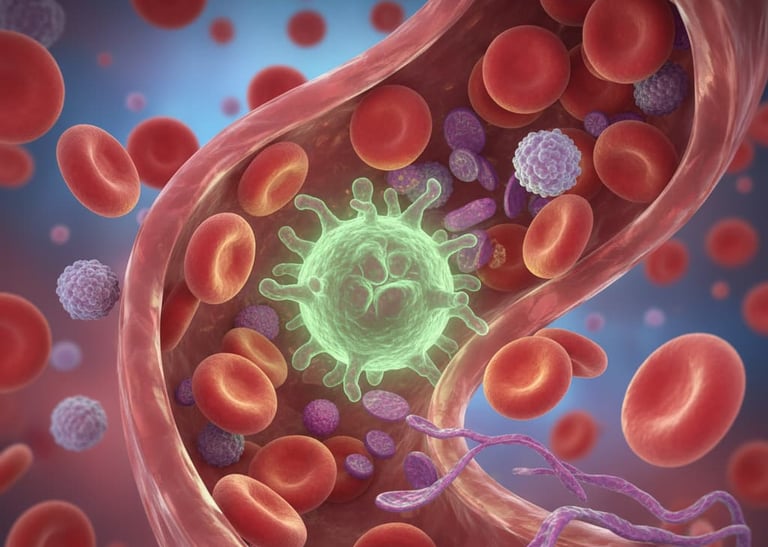Blood Cancer Awareness Month: Myths, Facts, and a Doctor’s Perspective
September marks Blood Cancer Awareness Month, focusing on leukemia, lymphoma, and myeloma—the most common blood cancer in India. From myths and facts to early warning signs, this doctor’s perspective spreads awareness, breaks stigma, and offers hope for patients and families through knowledge, support, and timely treatment.


As a physician, I believe awareness is often the first step toward saving lives. Every September, we mark Blood Cancer Awareness Month, a time to shed light on conditions that affect the lifeline of our body – the blood.
Blood cancer is not one single disease. They are a group of cancers that occur when blood cells grow uncontrollably and fail to function properly. The three main types are:
Leukemia – cancer of the white blood cells, usually starting in the bone marrow.
Lymphoma – cancer of the lymphatic system, which protects us from infections.
Myeloma – cancer of plasma cells, a type of white blood cell that produces antibodies.
While leukemia and lymphoma are widely discussed, multiple myeloma is the most common blood cancer in India – a fact that deserves more attention.
Why Blood Cancer Awareness Matters
In my practice, I often meet patients who dismiss early symptoms of blood cancer as “normal tiredness” or “old age.” Fatigue, recurrent infections, bone pain, or unexplained weight loss may sound harmless, but they can be red flags.
Early diagnosis and timely treatment save lives. Unfortunately, fear and myths often delay patients from seeking help. Awareness bridges this gap by empowering people with knowledge and reducing stigma.
Myths vs. Facts About Blood Cancer
Let’s address some common misconceptions I hear from patients and their families:
Myth 1: Blood cancer is contagious.
Fact: Blood cancers are not infectious. They occur due to abnormal cell growth, not by transmission from one person to another.
Myth 2: Only elderly people develop blood cancers.
Fact: Blood cancers can affect all age groups. Acute lymphoblastic leukemia (ALL) is actually the most common cancer in children.
Myth 3: A blood cancer diagnosis means certain death.
Fact: The survival and cure rates of Blood Cancers have improved remarkably in the past 2 to 3 decades. With modern treatments such as targeted drugs, and immunotherapy and bone marrow transplant, survival rates have improved significantly. Many patients live long, fulfilling lives.
Myth 4: Alternative medicine can cure blood cancer.
Fact: There is no scientific evidence for this. Supportive care like yoga, meditation, or nutrition may help overall wellbeing, but the cure lies in evidence-based medical treatments.
Myth 5: Patients with blood cancer must isolate completely.
Fact: During treatment, precautions are needed because of low immunity. But with care, patients can and should continue to engage with loved ones – emotional support is vital for recovery.
The Indian Reality: Myeloma in Focus
India faces a unique challenge – multiple myeloma is the most common type of blood cancer here. Unfortunately, diagnosis is often delayed, either due to lack of awareness or access to healthcare. By the time patients reach specialists, many would have already developed complications.
As a physician, I often see the fear and uncertainty that comes with a diagnosis of multiple myeloma. It is natural to feel overwhelmed, but I want to reassure you—myeloma is not the end of hope. In fact, it is the most common blood cancer in India, and with this awareness has come rapid medical progress. Today, patients benefit from advanced treatments such as targeted therapies, stem cell transplantation, and immunotherapy, which have dramatically improved both survival and quality of life.
Early diagnosis plays a key role. If symptoms such as persistent bone pain, frequent infections, or unexplained fatigue arise, consulting a specialist promptly can make a life-changing difference. Most importantly, remember that you are not alone—patients, families, and healthcare professionals walk this journey together. With timely care, support, and determination, life with myeloma is not only possible but meaningful. There is always reason to hold on to hope.
How You Can Help During Blood Cancer Awareness Month
Learn and Share – Educate yourself and spread awareness about early signs of blood cancer.
Support Patients – Offer blood donations, emotional support, or volunteer with cancer support groups and show solidarity.
Encourage Checkups – Urge friends and family not to ignore symptoms like persistent fatigue or bone pain.
The Message of Hope
As a doctor, I want to reassure every patient and family – a diagnosis is not the end of the story. Medicine is evolving, survival is improving, and with community support, life after cancer is possible.
This Blood Cancer Awareness Month, let’s replace myths with facts, fear with courage, and stigma with compassion. Together, we can bring hope to thousands of patients and families fighting blood cancer.
For people in and around kerala: To know more, to understand the spectrum of clinical hematology and to avail hematology related services, reach out to the Department of Clinical Hematology (RACTHAM), Believers Church Medical College Hospital.
